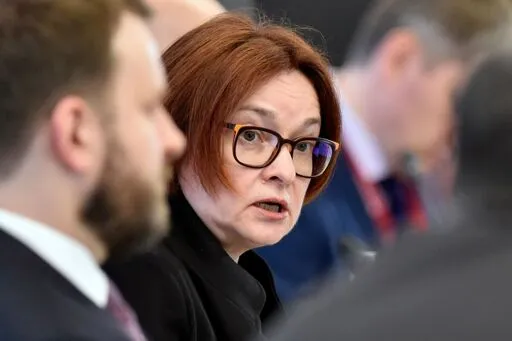Russia: Putin’s Central Banker Under Pressure to Cut Record-High Interest Rates
Russia: Putin’s Central Banker Under Pressure to Cut Record-High Interest Rates
Bloomberg - Are you a robot?

TLDR:
- Russian Central Bank (RCB) Governor Elvira Nabiullina has been urged to reduce the benchmark interest rate of currently 21%.
- Large corporations have been calling for such a move in recent months, but public comments by government officials now heaped pressure on the RCB as threats of a recession loom.
- Production of civilian goods in Russia fell 0.8% per month in the first quarter 2024, reaching its lowest level since April 2023, while the central bank eased reserve requirements on restructured loans for commercial banks last month as many companies are facing difficulties to repay loans.
- Lowering the benchmark interest rate, however, may fuel inflation further, Russian economists say.
Russia's government expects central bank governor Elvira Nabiullina to reduce the benchmark rate [at 21% since October 2024] as the effect on the budget and civilian industries becomes more apparent, three officials familiar with the situation said, declining to be identified as the information is not public. Some are calling for the cut to come at the next central bank meeting on Friday.
Those comments signal a shift in the government’s position since November, when Finance Minister Anton Siluanov backed Nabiullina’s rate hikes, saying that bringing down inflation was the priority.
Nabiullina, 61, was widely praised for policies — including capital controls — that helped stabilize Russia’s economy in the initial months following President Vladimir Putin’s full-scale invasion and she continues to enjoy the Russian leader’s backing.
...
Nevertheless, months of high borrowing costs are weighing on large parts of the economy, especially those unrelated to the military, and many firms are poised to halt investments. Growth in the overall Russian economy is mostly supported by government spending on the war.
“The challenge for the central bank now lies in choosing between two risks,” said Olga Belenkaya, an economist at Finam in Moscow. Keeping the rate unchanged risks tipping the economy into recession, cuts could see inflation spiral out of control, she said.
...
Revenue from oil and gas exports is also declining on the back of lower crude prices coupled with a stronger ruble. Authorities have already revised the budget forecast and more than tripled the fiscal deficit target.
The impact from high rates has rippled through Russia’s industrial sector. Severstal PJSC, once a flagship steel producer in terms of profitability, reported negative cash flow of 33 billion rubles ($421 million) in the first quarter. A year ago the cash flow was positive and stood at 33 billion rubles.
Hefty borrowing costs have weighed on customers and delayed their projects, and that has complicated Severstal’s ability to generate stable income, a spokeswoman for the company said. The steelmaker has been forced to fund its investment program and working capital with previously accumulated cash reserves. She said the central bank would have to cut its benchmark rate to at least 15% for the company to return to a more normal situation.
Many big Russian companies share those views and dozens, like Severstal, have scrapped final dividend payments for 2024.
Outside of sectors dominated by the defense industry, there are signs of a coming recession, according to an April report by the Moscow-based Center for Macroeconomic Analysis and Short-term Forecasting. Production of civilian goods fell 0.8% per month in the first quarter, reaching its lowest level since April 2023 and raising fears of stagnation, according to the report.
The central bank late last month issued a recommendation to lenders to offer loan restructuring in order to support corporate borrowers facing temporary difficulties. To facilitate this, the central bank eased reserve requirements on restructured loans.
...
With Russia’s economy contracting by a seasonally adjusted 1.2% quarter-on-quarter in 1Q25 and credit conditions tightening, the government risks facing a recession this year.
...
Public comments by senior members of the government have heaped pressure on Nabiullina ahead of the next meeting.
...
In December, Nabiullina urged “patience,” because tight monetary policy was working and should eventually bring about a decline in inflation.
[Edit typo.]